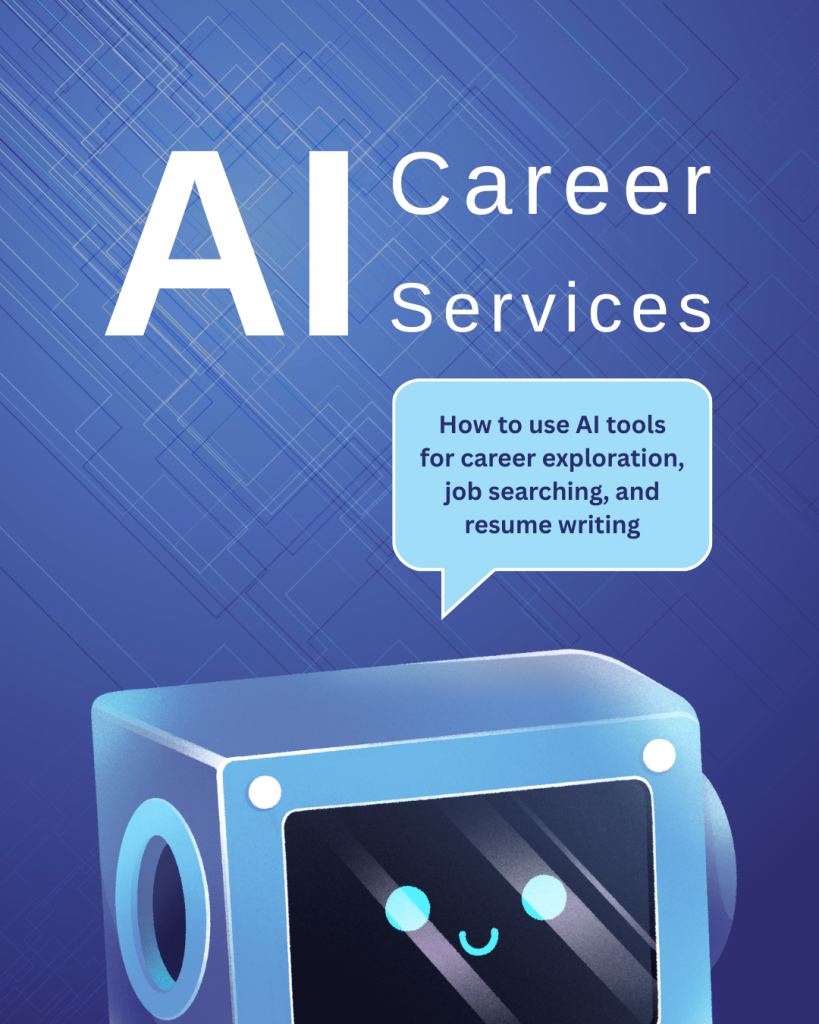AI is becoming a practical, everyday resource for career development. Whether you’re figuring out what you want to do after graduation, searching for a job, or fine-tuning your résumé and cover letter, AI tools can help you work smarter and faster. Like any tool, its value depends on how you use it. In this guide, we’ll explore three ways AI can support your career journey, plus an important reminder about why your own expertise and personality should always lead the way.
1. Career Exploration: Finding Your Direction
If you’re unsure about your next step, AI can help you discover options you might not have considered. AI-powered chatbots and career exploration platforms can analyze your skills, interests, and values to suggest possible paths that align with the current job market.
For example:
- You might ask an AI tool, “What can I do with a degree in psychology?” and get a list of roles ranging from school counselor to UX researcher, complete with descriptions and salary ranges.
- You could input your top strengths, such as communication, problem-solving, and creativity, and get suggestions for fields where those abilities are in demand.
Some tools can even help you identify the types of work environments and roles that align with your personality. While this is no substitute for deep self-reflection or conversations with career advisors, it’s a quick way to generate ideas and broaden your perspective.
 |
Quick tip: Use AI results as a starting point. If something catches your interest, follow up with real-world research: review job postings, watch informational videos, or connect with professionals in that field through LinkedIn or alumni networks. |
2. Job Searching & Career Paths Based on Your Degree or Interests
Finding the right job often means sifting through hundreds of postings, and AI can make that process less overwhelming. Many job search platforms now have built-in AI features to match you with roles that fit your background, interests, and goals.
Examples of AI-powered tools for job searching include:
- Jobscan – Helps match your résumé to specific job postings by identifying the keywords employers are looking for.
- Handshake – Often used by recent college graduates, this platform uses AI to recommend opportunities that match your profile.
- Google Interview Warmup – Uses AI to simulate interview questions and provide feedback on your responses.
AI can also help you track labor market trends. For example, you could ask, “What entry-level jobs are growing in the healthcare field?” and receive data-driven suggestions with links to current postings. This is especially helpful if you’re looking to pivot careers or enter an emerging field.
 |
Quick tip: While AI can narrow down your search, you should still set your own priorities. If work-life balance, location flexibility, or growth potential are important to you, weigh those factors alongside AI recommendations. |
3. Tailoring Your Résumé and Cover Letter for ATS Success
Most employers now use an Applicant Tracking System (ATS) to filter applications before they reach a human recruiter. These systems scan résumés and cover letters for keywords, formatting, and relevant experience. AI tools can help you optimize your documents so they pass that initial screen.
Ways AI can help with application materials:
- Suggesting keywords to include based on the job description.
- Rewriting bullet points to be more results-oriented and concise.
- Generating a first draft of a cover letter tailored to the specific role.
 |
Quick tip: If you’re using AI to draft text, always personalize it. Incorporate real examples from your experience, adjust the tone to fit your style, and make sure the content is 100% accurate. |
4. Don’t Overdo It
AI can be a huge time-saver, but it’s not perfect. Here are a few reasons why you shouldn’t rely on it too heavily:
- Accuracy issues: AI can often produce confident-sounding but incorrect information.
- Generic language: Over-polished or formulaic phrasing can make your application feel impersonal. Hiring managers can often spot AI-generated writing, and it may be a turn-off if it lacks authenticity.
- Loss of your voice: Your experiences, personality, and professional style are unique, and that’s what makes you stand out!
Recent hiring trends show just how much employers are paying attention to authenticity. In today’s AI-heavy job market, both applicants and employers are leaning on technology to speed things up. Candidates may use bots to mass-apply, while companies deploy AI to filter résumés or even conduct virtual interviews. The result? A high-volume, low-connection process that leaves both sides feeling frustrated.
Because of this, some recruiters are going “old school” to make sure they’re connecting with real people: asking for paper résumés, preferring in-person interviews, or encouraging multiple touchpoints like career fairs, tabling events, and networking conversations. These personal interactions help employers gauge genuine interest and verify a candidate’s relevant experience, which can’t be faked by an algorithm.
It’s also worth noting that while AI can polish up a résumé beautifully, it can sometimes make candidates appear stronger on paper than they actually are. That may get you past an ATS, but it won’t hold up in a real interview if the résumé doesn’t reflect your actual skills and experiences.
 |
Bottom line: Use AI to make your job search easier, but don’t let it replace the relationship-building side of career development. Employers want to see your effort, your persistence, and your voice. Proofread carefully, personalize everything, and let your authentic self shine through, because that’s ultimately what hiring managers are looking for. |
AI can be an incredible career development ally: offering quick insights, tailored job leads, and application material first drafts. That said, its true power comes when you combine its speed and reach with your own judgment, personality, and authenticity. So go ahead and experiment with AI tools. Use them to spark ideas, streamline your job search, and give your résumé a competitive edge. But keep your hands on the wheel. Your story is yours to tell, and no LLM can replace that.
References:

